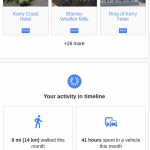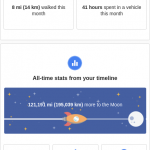Last Updated
MapMy October in Review – Courtesy of Google
I have Location History with Google enabled. In October, as you may have noticed, especially if you visit my site, you may notice I was traveling around Ireland fro pleasure and business. Google sent me this email. I’ve taken some screenshots of it.
It shocks me how good Google has gotten with this over time, even going back to old dates, it has enhanced the information and cross-referenced the photos I’ve backed up to Google Photos. It has created a timeline and trip report I’d love to have a copy of. I can extract the data…but not the presentation so easily.
But this is the level of presentation I’d like to achieve someday on this website for my own trips. Not sure how I’ll get there, but being as Google has teams of engineers and I play with my website as a hobby…might be a while.
IndiewebPress: Improving Comments
Comments in WordPress were originally thought of as a way for visitors to a site to have discussions on the site. I’m going to refer to the traditional comment idea as ‘local comments‘. This is where someone fills out a comment form on a post, which adds a comment to the page, either with or without moderation.
Also built-in to WordPress are pingbacks and trackbacks. These are where another site notifies of a link to the page and this is displayed as a comment on the page. Pingbacks and trackbacks have their issues, and admittedly, WordPress, except for some minor tweaks, has left the presentation and features of these mostly unchanged, save for some security efforts. Therefore, it has become common to disable them. Webmentions are a replacement for the older pingback and trackback protocols.
There are also custom comment types used for things like logs, receipts(See mention in Trac Ticket which notes that popular plugin Easy Digital Downloads does this), etc. which are not part of the general vision of what a comment is. Of course, custom post types aren’t all traditional posts either.
Meanwhile, other areas of WordPress are getting functions to register functionality. 1n December of 2015, a ticket was opened for Custom Comment Types. This would, in theory, mirror the functionality of Custom Post Types, where a registration function would declare the functionality and behavior of a comment type.
But there are issues here beyond what is identified in the ticket. How will a theme know how to display the new comment type? There needs to be a way for this to be specified by the registration and overridden by themes that know what that comment type is. There is a possibility there may be some breaking changes in that design.
Meanwhile, comments cannot be referenced uniquely and distinctly. There is another ticket equally old, proposing comment permalinks. Whether this is just to find the comment on whatever page it is on, or allowing a comment template that emphasizes the comment by itself, it is an aspect of the comment system that needs replacing.
That addresses the structure, but not what could be done with it. Not only would this allow for webmentions as a medium to create comments(webmentions being the successor to pingbacks), but support for responses that are popularly used today such as like, emoji, annotation, etc. The Semantic Linkbacks plugin tries to create these relationships in comment meta, but it is not as robust as a supported implementation would be.
Annotations and marginalia recently have been of interest in allowing people not to just comment on a post as a whole, but on specific areas of it. This could also be a promising piece of a comment overhaul…supporting this. In my contributions to the Webmentions plugin, I started this by supporting URL fragments(see fragmentions), which would allow for a specific part of the post to be highlighted.
IndiewebPress: Connecting Your Site and Mine
In the previous article, I discussed my thoughts on the subject of comments as a structure and what comments could be capable of if that structure was improved. But, when I showed that to several people, the comment was, quite legitimately, that I didn’t explain what could be built on top of that. I had another topic in mind before covering this, but that made me want to document this as well.
Let’s start with webmentions. Webmentions builds on the idea of the two protocols that are built into WordPress: Pingbacks and Trackbacks. Trackbacks have to be discarded from WordPress. There is no verification of them…it is basically letting anyone post something on your site…moderated or not. The other site tells you they’ve linked to you(even if they haven’t) and what to make it look like on your site. And because of this…while I’ve tried to think of ways to save it, I think it needs to, over time, go on the chopping block.
Pingbacks, despite actually verifying that a URL links to where it says it does, currently don’t do anything else interesting in WordPress. The appearance and usage has stagnated. It could be improved on the display side, and I’ve tried to get interest in that…but I’m wondering as we move forward…considering the legacy design issues, the bad feelings, what I would like to see happen with comments, etc…if we should just let Pingbacks stay where they are with only some performance and other minor refinements, and develop Webmentions.
Webmentions have advantages. They support update and delete functionality if the source changes in the future. They have a standard recommended by the W3C(which the previously implemented protocols do not), as well as a dedicated community who has implemented them on their sites.
What was never realized in potential by previous protocols, but Indieweb community members are implementing is the magic. Someone links to your site with a post on their site. They use webmention to tell you that they linked to you. But what your site does at that point is controlled by you. You can parse their post and display it as a comment, or based on how their page is marked up, derive other meaning and relationships from it. You can just use it in a simple counter or stat display to note how many people linked to you. There have been some fun discussions of using it to share bibliographic data.
If you had to pick one thing, webmention is the key building block on which the Indieweb is built. By itself, it requires no trust on the part of the receiver. There is a developing extension called Vouch which allows the sender to provide proof that someone the receiver knows trusts them. And, moderation aside, presentation of this is wholly left to the receiving site. Back to the comment point in the previous article on this, one of the functional WordPress problems is that there is no way for a plugin to declare a custom comment type and tell the theme how to display it or whether to display it at all. You effectively have to hijack the comment template to do this, instead of working with it.
To the point of something like annotations, the idea of fragmentions which allow a specific part of a post to be referenced more effectively…WordPress doesn’t support inline comments of any type or marginalia. There is a trac ticket to implement the W3C’s work on annotations, but WordPress has nothing to allow for displaying this sort of work.
There is a current Webmentions plugin for WordPress that is under continual development. It was created by Matthias Pfefferle, and I have been a regular contributor to it. It handles the functional plumbing of webmentions, but not the improved display aspect. That has been delegated by its creator to a second plugin, Semantic Linkbacks, which attempts to offer the parsing of external sites and deriving information like author(name and photo), etc.
It is worth trying the combination of these. But there is more that can be done here as well. Cover more types, improve the ability to store commenter’s data, etc.
IndiewebPress: Users
In the Indieweb world, your domain is your identity. This would suggest that most WordPress sites should only have one user…representing the identity of the site. Users, however, represent roles and responsibilities within the system, not necessarily content creators.
In an update to the ‘official’ Indieweb plugin, I, with some encouragement, added the idea of designating a specific user as the ‘identity’ of the site…assuming there was one. But let’s expand that idea a bit. We have user metadata, we have the ability to define new roles and capabilities. So, what can we do with this but create new possibilities? We can better work what a role is, and add additional properties and behavior to improve the system.
There is a setting for an admin email, for which the suggestion to expand outward has been proposed for 8 years in this vein. This should be a property of any administrative account.
I have an idea I’ve long wanted to implement. It is based on a feature used by Postmatic. People who subscribed to the email service they provided would end up as users on your site. I’d like to see enhancements to the user profile. When trying to add other site profiles to user metadata, I discovered that this being left to the plugins has resulted in a complete lack of consistency.
There needs to be a consistent structure to add data to support URLs on specific other types of sites( for example, Twitter), or every plugin is going to have to retread this. This is the trouble we have with all metadata unfortunately.
That idea of using the user table for outside visitors has a lot of good potential. Commenters could create a profile on your site that could be imported from elsewhere…namely your own website. There is a certain level of trust there, because you would be displaying images and text about a person from another site…however, that is what gravatar does. Why not allow people to do it from their own site?
Gravatar itself is something that WordPress wouldn’t have put in today….a reliance on an outside service. The local avatar trac ticket is also a rather old request. It is time to look at avatars in general…to build a robust local system that is enhanced by gravatar…gravatar should not be that system. We can add in modern themeable profiles for users, as opposed to just archive pages. We can make a much better system for users.
The whole point of the ‘subscriber’ role in WordPress is for people not part of the blog to have an account they can do something with…follow the site, get updates, participate in comments…but this part of WordPress is woefully underused.
This theme is going to continue to develop and be customized, but it is now, at the least, nice enough for me to use it. What do you think so far?
But obviously, professional teams of programmers who spend all day working on things can probably do a better job than I can, so I am taking advantage of tools that automatically send posts made on these services to my site. Many of the people who use my code have pointed out it doesn’t work perfectly with those tools and this gives me an excuse to try and fix it, while posting more to my site.
Chris Aldrich, a user of more social networks and tools than I can shake a stick at(if you don’t believe me, click here), suggested I think of those services as highly customized mobile apps that post to my site. Let’s see how that works out. However, if you aren’t interested in following me on my website, you can continue to follow me elsewhere, including the two latest places. Anything you say on those sites should be pushed back here.
Oath, the successor to AOL, announced that the platform will shut down for good on December 15th.
But today, I shut my instance down. Goodbye two decades of an online identity. Let’s just take a moment there to think about that. The friends and connections made on this service by not just me, but others. We may have moved on to other places, I may have lost touch with some, and migrated to new services with others, but I still think about them now and then.
You can usually find me on Hangouts…until they shut that down, or several alternative platforms.
So, today, I’m going to take some opinions on this and crowdsource some input, since I’m at IndieWebCamp NYC. What belongs on my page in regards to details? Here are some examples.
- A better bio of me? I never know what to say about myself.
- More places to find me. I was thinking of joining Instagram and posting more photos.
- I have my resume up on the site somewhere, but that is different than a bio.
So, any ideas? I’m not good at self-promotion and I know I’m opening myself up by asking the web as a whole.
So, when I want to talk about my latest tech obsession, and I do have a few, I’ll be doing it over there. Feel free to subscribe. The site already had it’s own Twitter, Facebook, and other feeds as well.
For those of you Indieweb-inclined…I made sure it supports webmentions and such, and will likely add more of that in the future.
After 3 weeks, finally starting my 21 hour journey home.
It is the most mainstream of the plugins I’ve developed, but has only 30 active installations, which suggests location may not be important to that many people who have WordPress sites, or I haven’t made the plugin good enough. I’m working on the latter now. Anyone have any suggestions?


